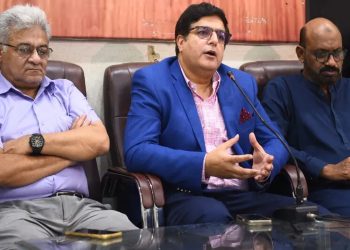ISLAMABAD: The Supreme Court on Friday directed the federal government to bring the recent changes in the rules of the Exit Control List (ECL) within the “ambit of the law” within a week, cautioning that it would issue an order if its directive was not followed.
A five-member bench, headed by Chief Justice of Pakistan (CJP) Umar Ata Bandial, and comprising Justice Ijazul Ahsan, Justice Munib Akhtar, Justice Sayyed Mazahar Ali Akbar Naqvi, and Justice Mohammad Ali Mazhar, had taken suo motu notice on apprehensions that criminal justice might be undermined by people in authority.
When the hearing resumed today, Chief Justice Bandial said the government should take adequate steps to bring the amendments within the ambit of the law. “We do not want to interfere in executive powers right now.”
At the start of the hearing, the CJP grilled Attorney General Ashtar Ausaf about the process to remove names from the ECL.
Ausaf said freedom of movement and to travel abroad where constitutional rights of every citizen and a person’s name could not be put on the ECL simply because of ongoing investigations by the National Accountability Bureau (NAB) and the Federal Investigation Agency (FIA).
The federal government analyses a person’s right to freedom of movement and the allegations leveled against him before putting his name on the ECL, he informed the court.
“The government amended the ECL rules after fulfilling all legal aspects. The cabinet has written that the amendments will be applied retroactively. Amendment of ECL Rules is at the discretion of the federal government.”
He told the court that cabinet members’ names were removed from the ECL so the government could function smoothly. “There is no law that states discussion with NAB is necessary for removing the names.”
The chief justice remarked that the court was aware the government had “freed” a person it had instructed to be jailed, without naming that person. When the attorney general argued that the reference against the said person was from 2018, the CJP noted the SC’s order was from 2021.
However, AGP Ausaf contended that the court’s orders had been implemented but the person was freed after the case was concluded.
Justice Bandial said if an agency was investigating someone, the government should hold discussions with it prior to removing the person’s name from the ECL.
When the attorney general said names were put on the ECL on NAB’s instructions, the chief justice said it meant the anti-graft watchdog considered the matter prior to issuing instructions.
“NAB does not put every suspect’s name on the ECL. According to NAB, the names of people who looted billions were removed.”
Ausaf argued that NAB could request re-adding a person’s name to the ECL. “NAB would refer [again] only if it knew of the removal. The name of a suspect, who the SC directed [to be put on ECL], was also removed,” the CJP said.
Justice Naqvi observed that it would have been better for the government to look at each case individually.
Justice Bandial said the court desired that justice be done with everyone through implementation of the law. He also questioned why the changes were applied retroactively.
However, the attorney general denied that the purpose was to benefit specific people.



































